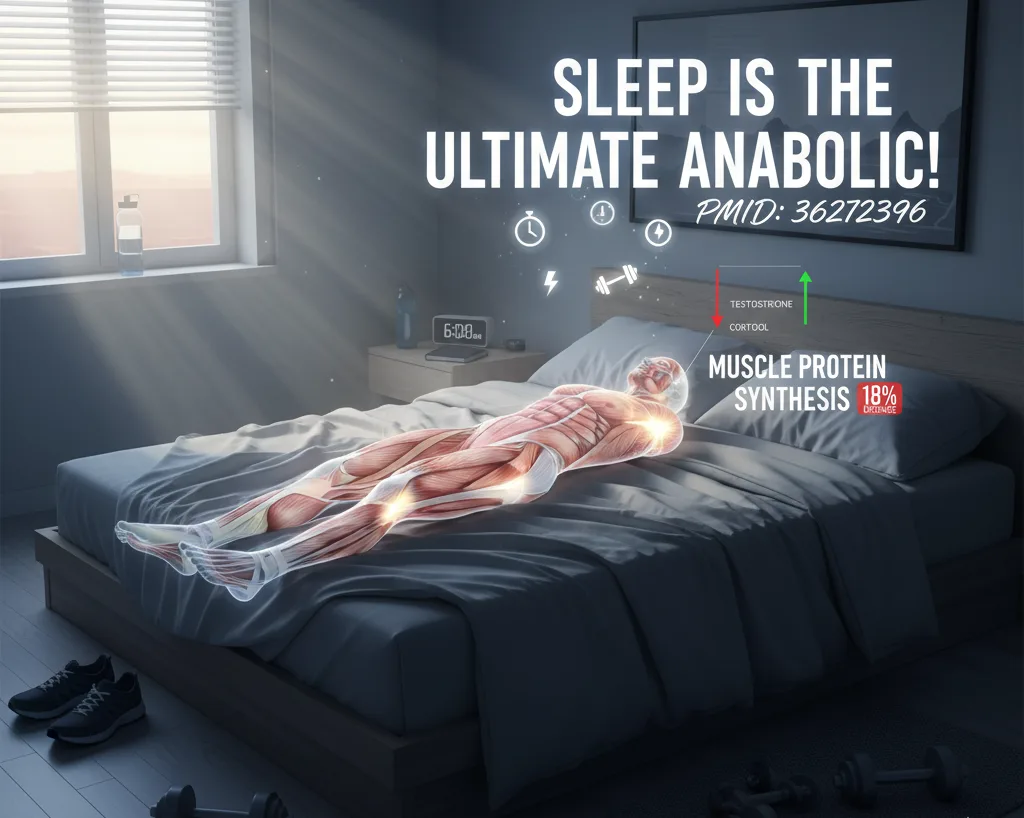For athletes and fitness enthusiasts, the focus is often on training volume and nutritional intake. However, a growing body of research, including the study highlighted in the original text (PMID: 36272396), confirms that sleep is the single most critical, non-negotiable component of recovery and muscle development.
The data is clear: sabotaging your sleep—even for just one night—can create a hormonal and physiological environment so hostile to muscle growth that no supplement or drug can effectively counteract the damage.
The Devastating Impact of One Night of Sleep Deprivation
The study you referenced provides the most direct evidence of the rapid catabolic (muscle-wasting) and anti-anabolic (anti-muscle-building) state induced by acute sleep loss. The results are a wake-up call for anyone prioritizing a late-night social life or work schedule over rest.
1. Muscle Protein Synthesis (MPS) Plummets
-
The Loss: An 18% decrease in muscle protein synthesis (MPS).
-
The Explanation: MPS is the process by which muscle fibers repair damage and build new tissue—it is the essence of muscle growth (hypertrophy). After a strength training session, your muscles are primed to build, but this process is highly dependent on sleep. By reducing MPS, one night of poor sleep immediately cuts the effectiveness of your workout, essentially hindering your body's ability to turn training effort into physical gains.
2. Testosterone (The Anabolic Hormone) Drops
-
The Loss: A 24% decrease in plasma testosterone level.
-
The Explanation: Testosterone is the primary anabolic hormone in both men and women, crucial for muscle repair, strength development, energy, and overall athletic drive. The most significant release of testosterone often occurs during the later stages of deep sleep. When sleep is lost, this vital hormonal release is suppressed, switching the body into a less optimal, low-power state for recovery and performance.
3. Cortisol (The Catabolic Hormone) Soars
-
The Gain: A 21% increase in cortisol level.
-
The Explanation: Cortisol is the body's primary stress hormone. While it's necessary for life, consistently high levels are highly catabolic, meaning they promote the breakdown of muscle tissue for energy. The increase in cortisol, combined with the drop in testosterone, creates an aggressive catabolic environment where the body is more likely to break down muscle than build it up. This dramatically shifts the hormonal balance away from recovery and toward stress and tissue breakdown.
Beyond Muscle: The Performance and Health Consequences
The hormonal and metabolic shifts caused by sleep deprivation do not only affect muscle size—they have severe consequences for athletic performance, mental acuity, and long-term health.
The Undeniable Conclusion: Prioritize Sleep as a Training Tool
The takeaway from the research is profound: Sleep is not a luxury; it is the most potent recovery and performance tool available.
Just as a professional athlete would never skip a key training session or ignore their calorie requirements, they must treat sleep with the same reverence. The text correctly states that no supplement in the world can undo the destructive cascade of hormonal imbalances caused by a lack of sleep.
Actionable Steps for "Elite" Sleep
-
Aim for Quantity: Most athletes need 7-9 hours of sleep per night, and sometimes more during periods of intense training.
-
Maintain Consistency: Go to bed and wake up around the same time every day, even on weekends. This regular schedule strengthens your circadian rhythm (the body's internal clock), which governs optimal hormone release.
-
Optimize the Sleep Environment: Keep your bedroom cool, dark, and quiet. Minimize exposure to blue light (from screens) for an hour before bed, as it suppresses melatonin, the hormone that signals sleep.
-
Recognize the Warning Signs: If you are chronically groggy, constantly craving stimulants (like caffeine), or experiencing a plateau in your strength or muscle gains, your sleep is likely the missing link.

